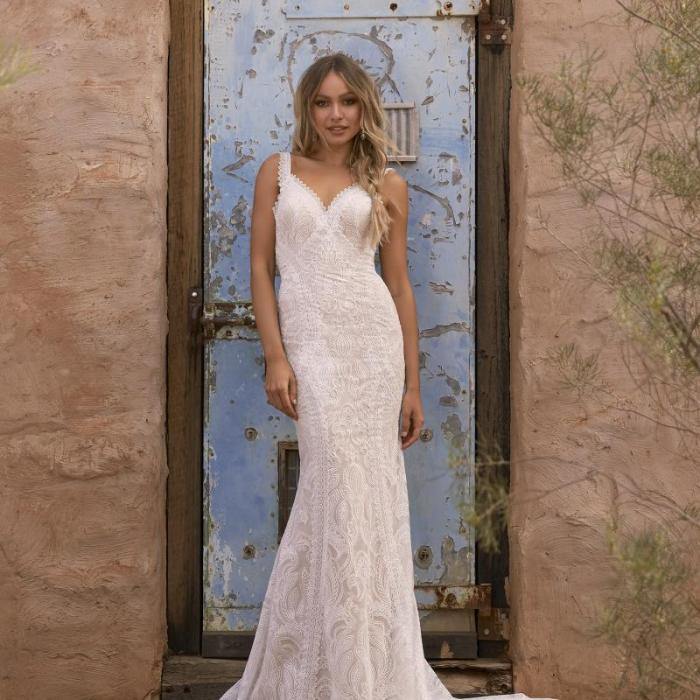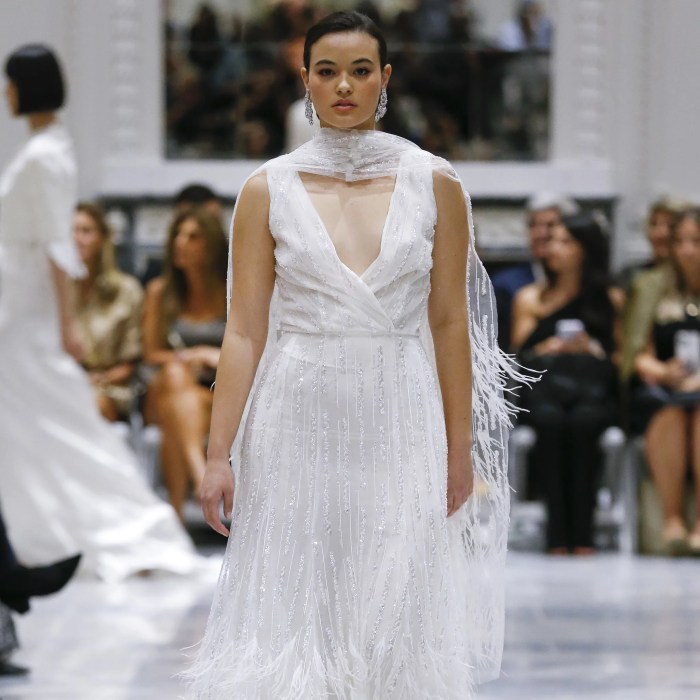Traditional Nigerian Wedding Dress Styles
Nigerian african wedding dresses – Nigerian weddings are vibrant celebrations of culture and tradition, and a significant part of this celebration is the attire. The diverse ethnic groups across Nigeria boast unique and stunning wedding dress styles, each carrying deep cultural significance. This section explores three prominent styles: Yoruba, Igbo, and Hausa.
Yoruba Wedding Dress Styles
Yoruba wedding dresses are often characterized by their rich, vibrant colors and intricate embroidery. The aso oke, a hand-woven cloth, is a staple fabric, often featuring bold geometric patterns and symbolic designs. The styles themselves vary, from flowing, elegant gowns to more structured, fitted pieces. The colors used often reflect the couple’s family lineage and personal preferences, but deep reds, golds, and vibrant blues are frequently seen.
Igbo Wedding Dress Styles
Igbo wedding attire often showcases a blend of traditional and modern elements. While the use of vibrant colors is common, Igbo dresses may incorporate more subtle patterns and embellishments compared to Yoruba styles. The choice of fabric can range from intricate lace to elegant silk, often incorporating beading or embroidery to add detail. The silhouette is often more form-fitting, emphasizing a sleek and sophisticated look.
Hausa Wedding Dress Styles
Hausa wedding dresses are known for their elegant simplicity and sophisticated designs. Often featuring flowing silhouettes and rich, deep colors, these dresses often incorporate luxurious fabrics like silk and velvet. Embellishments are typically understated, with a focus on clean lines and elegant draping. The use of gold embroidery or subtle beading is common, adding a touch of opulence without overwhelming the design.
Comparison of Nigerian Wedding Dress Styles, Nigerian african wedding dresses
The following table summarizes the key differences in fabric, color palette, and embellishments across these three styles:
| Style | Fabric | Color Palette | Key Embellishments |
|---|---|---|---|
| Yoruba | Aso Oke, Lace | Deep reds, golds, vibrant blues | Intricate embroidery, beading |
| Igbo | Lace, Silk, George | Variety of colors, often with more muted tones | Beading, embroidery, subtle patterns |
| Hausa | Silk, Velvet | Deep, rich colors like emerald green, burgundy | Gold embroidery, subtle beading |
Modern Interpretations of Nigerian Wedding Dresses: Nigerian African Wedding Dresses
Contemporary Nigerian designers are skillfully blending tradition with modern aesthetics, creating wedding gowns that resonate with both heritage and contemporary style. This fusion results in innovative and breathtaking designs that capture the essence of Nigerian culture while catering to modern brides’ preferences.
Innovative Design Choices in Modern Nigerian Wedding Gowns
Modern Nigerian wedding gowns often incorporate unexpected silhouettes, necklines, and sleeve styles. A-line gowns with a modern twist, mermaid styles with intricate beading, and ball gowns with bold color choices are common. Off-the-shoulder necklines, high necklines, and dramatic sleeves add contemporary flair. The use of modern techniques like laser cutting on fabrics adds an element of sophistication.
Influence of International Fashion Trends
International fashion trends, such as the use of sleek minimalist designs or the incorporation of lace details, subtly influence modern Nigerian wedding attire. However, these influences are often thoughtfully integrated to complement rather than overshadow the inherent cultural richness of the designs.
Example of a Modern Nigerian Wedding Dress
Imagine a modern Nigerian wedding dress inspired by the Yoruba style. The dress features a flowing A-line silhouette crafted from luxurious silk in a deep coral hue. Intricate gold embroidery, reminiscent of traditional aso oke patterns, adorns the bodice and flows down the skirt. The neckline is a modern off-the-shoulder design, adding a contemporary touch. The overall aesthetic is one of refined elegance, seamlessly blending tradition with modern sensibilities.
Accessories and Styling for Nigerian Wedding Dresses
Accessories play a crucial role in completing the Nigerian wedding ensemble, adding cultural depth and enhancing the overall aesthetic. Headwraps, jewelry, and footwear are essential elements that reflect traditions and personal style.
Essential Accessories for a Complete Nigerian Wedding Ensemble
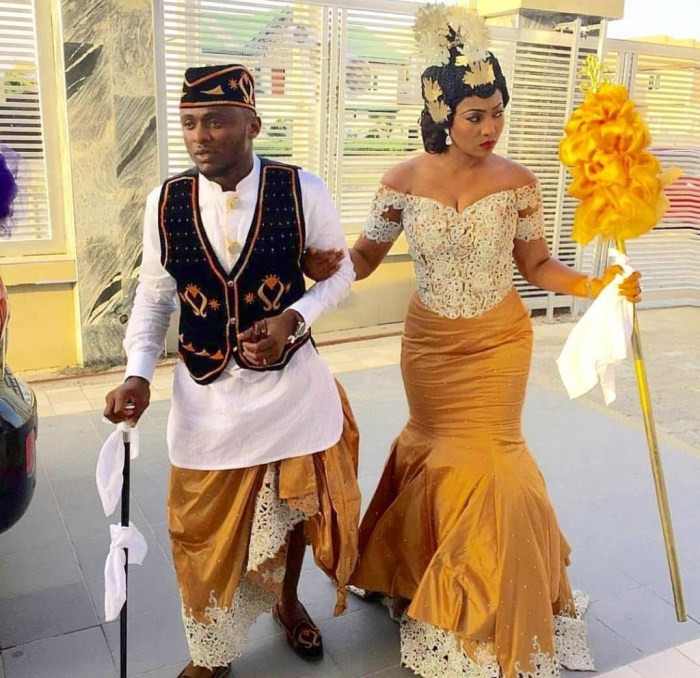
Source: buzznigeria.com
- Headwrap (Gele): A meticulously styled headwrap is a cornerstone of many Nigerian wedding looks, symbolizing elegance and sophistication.
- Coral Beads: Coral beads, often seen in Igbo culture, represent prosperity and good fortune.
- Traditional Jewelry: Necklaces, earrings, and bracelets, often featuring gold or intricate designs, add a touch of opulence.
- Elegant Shoes: Shoes, often matching or complementing the dress color, complete the look while maintaining comfort.
- Handbag: A beautifully crafted clutch or handbag adds a final touch of elegance and practicality.
Styling Considerations for Different Body Types
Choosing a Nigerian wedding dress and accessories that flatter one’s body type is crucial. For example, A-line silhouettes are generally flattering for most body types, while mermaid styles accentuate curves. The choice of accessories can also help to enhance certain features and create a balanced overall look.
The Role of Fabric in Nigerian Wedding Dresses
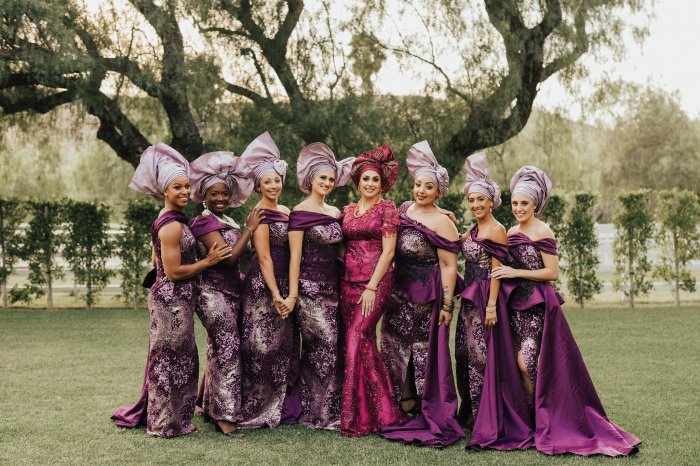
Source: squarespace-cdn.com
The choice of fabric significantly impacts the overall aesthetic and feel of a Nigerian wedding dress. Several fabrics are traditionally and popularly used, each possessing unique qualities that contribute to the garment’s beauty and cultural significance.
Nigerian African wedding dresses often showcase vibrant colors and intricate beadwork, reflecting the rich cultural heritage. A beautiful modern interpretation might incorporate elements like a stunning floral embroidered wedding dress , adding a touch of elegance and sophistication. This style could seamlessly blend with traditional Nigerian fabrics and designs, creating a truly unique and memorable bridal look.
Commonly Used Fabrics and Their Properties
Aso oke, lace, silk, and George are some of the most common fabrics. Aso oke, a hand-woven cloth, is prized for its durability and rich texture. Lace adds intricate detail and elegance, while silk offers a luxurious drape and sheen. George fabric, known for its shimmering effect, provides a glamorous touch.
Fabric Comparison: Drape, Texture, and Aesthetic Impact
Aso oke provides a structured, bold look, while lace offers delicate detail. Silk drapes beautifully, creating a flowing silhouette, and George fabric adds a sense of shimmer and sophistication. The choice depends on the desired aesthetic and the specific style of the dress.
Advantages and Disadvantages of Fabrics
- Aso Oke: Advantages – Durable, rich texture; Disadvantages – Can be less versatile in terms of style.
- Lace: Advantages – Intricate details, elegant; Disadvantages – Can be delicate and require careful handling.
- Silk: Advantages – Luxurious drape, sheen; Disadvantages – Can be expensive and require special care.
- George: Advantages – Shimmering effect, glamorous; Disadvantages – Can be prone to wrinkling.
Illustrative Examples of Nigerian Wedding Dresses
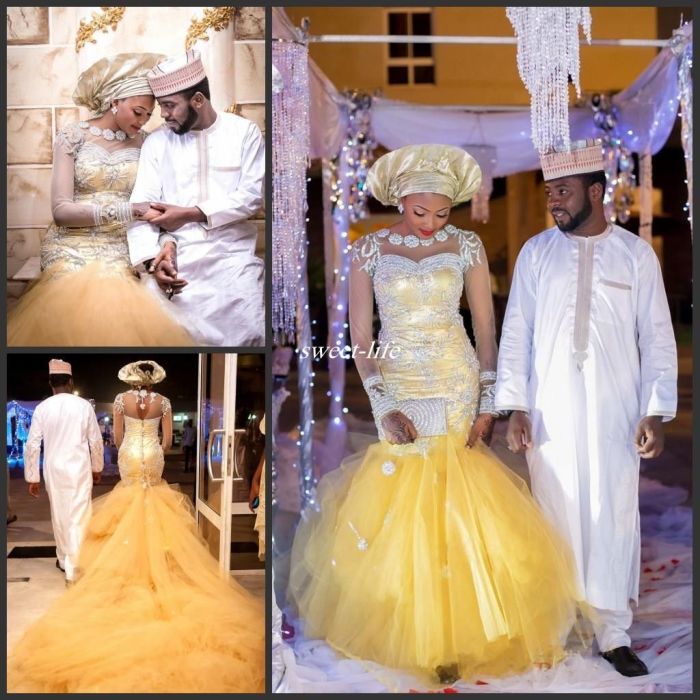
Source: dhresource.com
Three distinct Nigerian wedding dresses, each embodying unique cultural influences and design elements, are described below.
Dress 1: A vibrant coral-colored gown, inspired by the Igbo style, features a fitted bodice adorned with intricate beadwork. The skirt flares gently, creating a flattering A-line silhouette. The fabric is a luxurious silk, giving the dress a rich, luxurious feel. The overall aesthetic is one of sophisticated elegance, reflecting the blend of traditional and modern influences in Igbo culture.
Dress 2: This dress showcases a modern interpretation of the Yoruba style. The fabric is a deep emerald green aso oke, its intricate geometric patterns creating a striking visual impact. The silhouette is a sleek mermaid style, emphasizing the bride’s figure. Gold embroidery accents the bodice, adding a touch of opulence. The overall effect is a stunning blend of tradition and contemporary design.
Dress 3: This flowing gown, inspired by the Hausa style, is crafted from rich burgundy velvet. The silhouette is a graceful A-line, emphasizing elegance and simplicity. Subtle gold embroidery adorns the neckline and sleeves, adding a touch of sophistication without overpowering the design. The overall aesthetic is one of understated luxury and refined beauty.
Popular Questions
How much do Nigerian wedding dresses typically cost?
The cost varies greatly depending on the fabric, embellishments, designer, and complexity of the design. Prices can range from a few hundred to several thousand dollars.
Where can I find Nigerian wedding dresses for sale?
You can find Nigerian wedding dresses at boutiques specializing in African fashion, online retailers, and directly from designers. Many designers also offer custom designs.
Can I wear a Nigerian wedding dress if I’m not Nigerian?
Absolutely! The beauty of these dresses transcends cultural boundaries. Many brides of diverse backgrounds choose to incorporate elements of Nigerian style into their weddings.
How do I care for a Nigerian wedding dress after the wedding?
Dry cleaning is usually recommended, especially for delicate fabrics like lace or silk. Always follow the care instructions provided by the designer or retailer.

